In this edition I take you through another 5 charts which increasingly show a clear turning point in sentiment from previous pessimism to tentative optimism on the fundamentals outlook. Indeed, while you don't want to go flippantly throwing around the term "melt-up", if these nascent signals get momentum we could see a pessimism-capitulation-driven melt-up in stocks.
New highs anyone?
Firstly, for context, in the Sentiment Snapshot series I look at some of the charts and data from the weekly survey on Twitter, which asks respondents to indicate whether they are bullish or bearish for primarily technical or fundamental rationale. I also add a few other charts from time to time when it helps explore a certain theme.
The key takeaways from the weekly sentiment snapshot are:
- This week we saw a big rebound in "fundamentals" sentiment.
- Overall equity net-bulls rose to a 28-week high.
- It looks like we are at a turning point in the Pessimism Gauge, with a potential pessimism-capitulation melt-up in stocks on the cards.
- Our own indicators add further context and evidence to this thesis.
1. Fundamentals vs Technicals Sentiment: This week we saw quite the rebound in S&P 500 fundamentals net-bulls (albeit respondents are still net-bearish, just less so). Meanwhile on technicals net-bulls it was another strong showing. This lift in fundamentals and technicals sentiment placed the overall net-bulls figure at a 28-week high of 10% (i.e. total bulls 55%, total bears 45%).
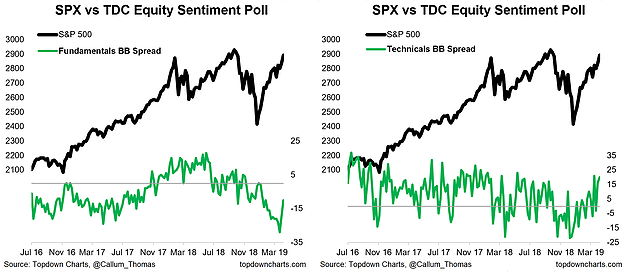
2. Fundamentals Sentiment - Bonds vs Equities: The rebound in equity fundamentals sentiment was mirrored (albeit slightly less so) in the results of the bond survey (where investors had been very bullish on the fundamental outlook - recall a deteriorating growth/inflation outlook is bad for equities, and good for bonds). It's early days, but there looks to be something going on here (also for what it's worth, I've seen a number of "green shoots" in the global PMI data for March).
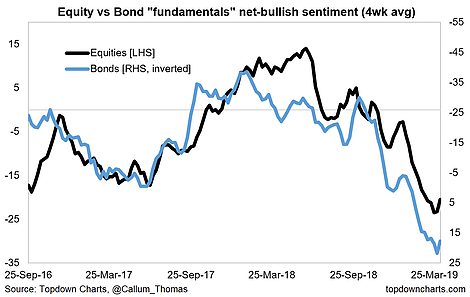
3. Pessimism Gauge: Bringing in the Pessimism Gauge from last week (combination of "Bearish fundamentals" responses for equities and "Bullish fundamentals" responses for bonds), the turning point seems to be in, with further progress made this week. I can't help but wonder if this is going to be the mirror image of the absolute low point of this indicator in January last year (which is when the global PMIs and many global markets peaked). So again, a question to ask here is: 'will we see a bear market in pessimism next?'
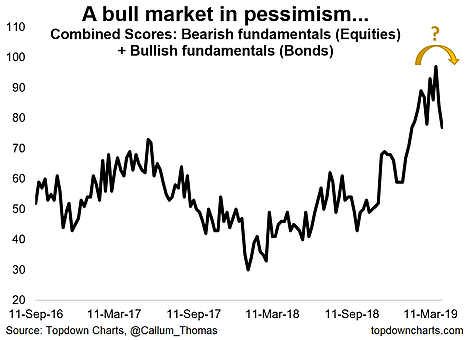
4. U.S. Earnings/Macro Pulse: Here's a chart which caught my eye as I was updating some charts last week, it shows the U.S. "nominal surprise index" (combination of the Citi economic surprise index and inflation surprise index) and the earnings revisions indicator (combination of forward EPS rate of change and earnings revisions ratio). I call it the earnings/macro pulse monitor.
As you may have guessed there has been a complete collapse in both indicators since the peak around January 2018 (sounds familiar?). And now I would argue they are both "so bad it's good" i.e. around these levels it can't get much worse - and as we saw in the previous couple of charts, arguably this run of disappointing economic data and downward earnings revisions has driven a reset downwards in sentiment. This helps explain some of the persistently negative sentiment we've been seeing (e.g. institutional allocations to risk assets).
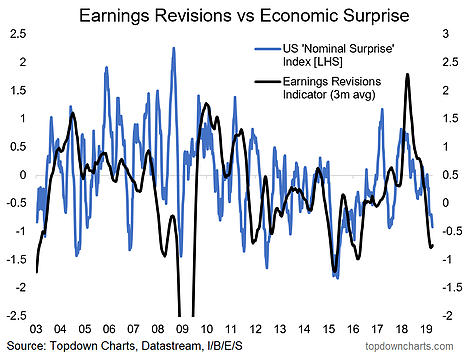
5. Composite Investor Sentiment Indicator - The Euphoriameter: Last chart this week is the Euphoriameter, which tracks a composite of surveyed sentiment and market driven sentiment metrics. After a big reset from extreme optimism in January last year, the Euphoriameter has now rebounded from the low point in December. This type of pattern of a major collapse and then recovery is historically a bullish development, and it echoes some of the conclusions from the note on the S&P500 gold cross from last week.
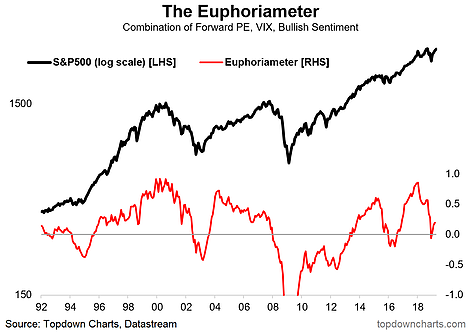
So with investors seemingly starting to have a change of heart on the fundamentals outlook, it's entirely possible that we could soon see a pessimism-capitulation melt-up in stocks. To be fair there are still a few things that could go wrong e.g. headlines/political risk, but faced with multiple pieces of supporting evidence, the path of least resistance for stocks is up.
